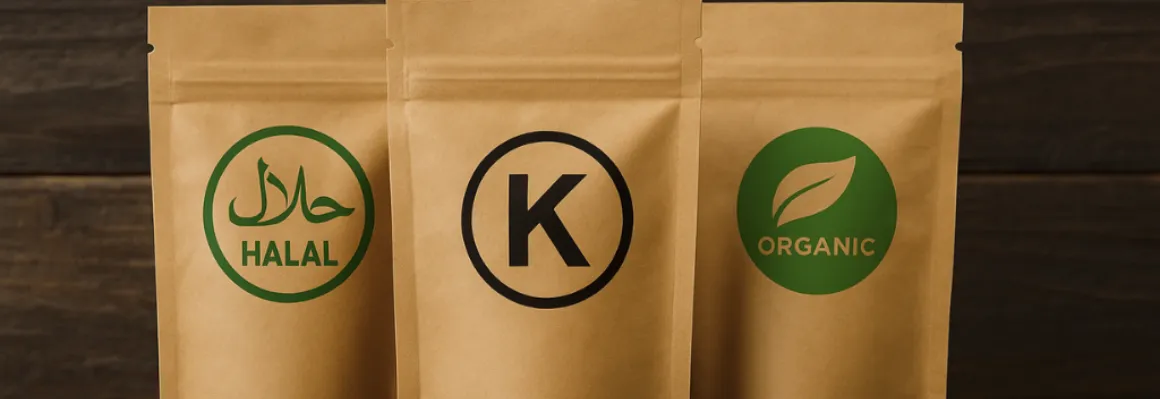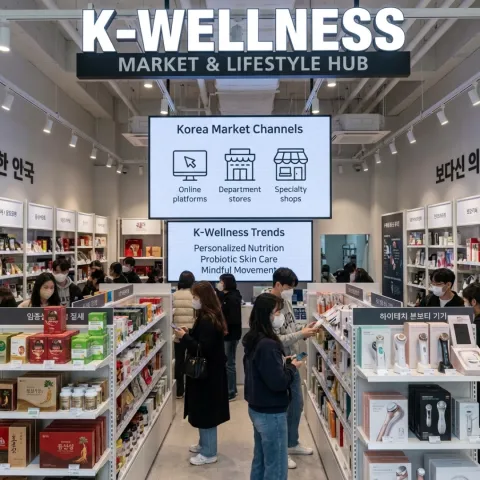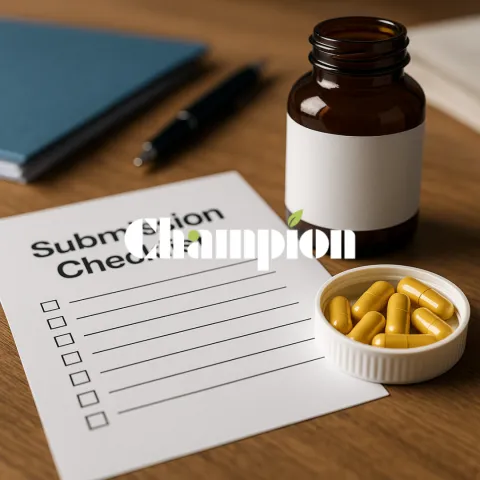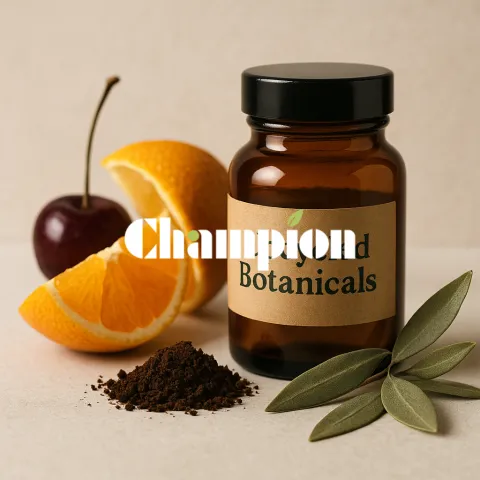Blog
20.Oct.2025
Halal, Kosher, Organic: How to Win Over Global Buyers

Introduction
Certification is the new currency for trust in the global supplement market. With an ethical, health-conscious, and multi-faith consumer base, winning shelf space and digital cart conversions in 2025 means understanding—and proudly displaying—Halal, Kosher, and Organic credentials. Beyond regulatory compliance, these marks unlock access to new demographics, premium pricing, and worldwide demand for clean, faith-friendly nutrition. Here’s why, how, and where to get certified for global growth in supplements.Global Market Overview: Why Certification Matters
- The global Halal-certified supplement market reached $6.27 billion in 2025, projected to surge toward $16.65 billion by 2034 (10%+ CAGR).
- The Kosher supplement market overlaps with Halal in many product categories, expanding access to Jewish, Muslim, vegetarian, and clean-label buyers—Kosher-certified capsules alone are projected to top $1.47 billion by 2034.
- Organic certification is a core driver for US/EU supplement growth, with organic-labeled supplements achieving a 30–70% price premium and global organic food sales passing $150 billion in 2025.
Certification communicates more than compliance:
- Traceability and real ingredient sourcing
- Clean/ethical formulation
- Suitability for religious/ethical dietary needs
- Enhanced brand prestige and export eligibility
Certification Types: Key Differences & Global Requirements
Halal Certification
- What it Covers: No haram (forbidden) substances (like pork, alcohol), clean ingredient sourcing, and compliant preparation processes. Facilities must prevent contamination, and all animal-derived ingredients must be from Halal-slaughtered animals.
- How to Obtain:
- Choose a recognized body (JAKIM, IFANCA, ESMA, ISA, GAC, HFA, WHC, national authorities).
- Submit all ingredient documentation, manufacturing protocols, and undergo facility/lab audits.
- Clearly label certified products; certification must be renewed, often annually, and applies to every SKU/batch.
- Regional Trends: Mandatory for GCC market entry (UAE, Saudi Arabia, Malaysia), increasingly expected in Southeast Asia, UK, France, and as a global credibility marker.
- Market ROI: Increases purchase intent among 1.9 billion Muslims worldwide, plus substantial uptake among health and flexitarian markets.
Kosher Certification
- What it Covers: Jewish dietary laws (Kashrut)—no pork or non-kosher animals, strict separation of meat/dairy, rabbinic supervision of processes, and ingredient tracing.
- How to Obtain:
- Select a recognized rabbinic certifier (OU, OK, Star-K, Kof-K, national authorities).halalfoundation
- Disclose all ingredient sources, processing, and cleaning schedules.
- Submit to audits, facility inspections, and rabbinical review for process compliance.
- Label using certifier’s approved symbol; periodic renewal and random spot-checks.Trends: Fastest-growing in North America and EU. Non-Jewish and vegetarian/vegan consumers increasingly view Kosher as a trust and food safety signal.
- Trends: Fastest-growing in North America and EU. Non-Jewish and vegetarian/vegan consumers increasingly view Kosher as a trust and food safety signal.
- Market ROI: Kosher certification is associated with higher repeat purchase rates and premium brand positioning, especially in the US/EU.halalfoundation+1
Organic Certification
- What it Covers: Non-GMO, no synthetic pesticides/herbicides/fertilizers, no irradiation, strict traceability from farm to formulation.
- How to Obtain:
- Engage an accredited certifier (USDA, EU Organic, Ecocert, national authorities).
- Prove clean agricultural sourcing, organic handling, and facility compliance.
- Submit to annual reviews, documentation, and residue/purity tests.
- Certified organic logo on packaging and in digital listings.
- Trends: Universal appeal, with particular popularity in affluent, urban, and eco-conscious global markets; demand outpaces conventional for many categories.
- Market ROI: Achieves higher margins, expands shelf access in premium organic/natural channels, and increases appeal among "free-from" and sustainability-driven buyers.
Table: Certification Feature Comparison
| Feature | Halal | Kosher | Organic |
| Religious Law Basis | Islamic (Quran/Shariah) | Jewish (Kashrut) | Secular/agricultural |
| Ingredient Bans | Pork, alcohol, haram | Pork, shellfish, mix | Synthetic, GMO, etc. |
| Animal Slaughter | Halal slaughter | Kosher slaughter | Often veg-only, but animal-derived ok if organic |
| Supervision/Audits | Imam/Auditor | Rabbi/Supervisor | Agency (USDA/EU, etc.) |
| Label/Logo Usage | Required for SKUs | Required | Required |
| Renewal | Annual/Batch | Annual/Batch | Annual |
| Primary Markets | MENA/SEA, global | US/EU/global | US/EU/global |
| Cross-Appeal | Yes (Muslim, clean) | Yes (Jewish, veg, safe) | Yes (eco, natural) |
Winning Over Global Buyers: Marketing & Channel Insights
- Transparency is Non-Negotiable: Most buyers (and retail partners) expect ready access to certificates, batch numbers, and even QR-code-based traceability to ingredient sources.
- Ethical + Functional is King: Younger buyers and Gen Z are fueling "intersectional" demand for products that are at once halal or kosher and organic, vegan, and clean-label.
- E-Commerce Leverage: Online stores are the fastest-rising halal and kosher supplement channel (projected to reach 28% of sales by 2033); building channel compliance, digital certificate verification, and influencer partnerships around ethical claims is critical.
- Premium Pricing & Export Growth: Certification unlocks shelf space in specialty/natural/health stores, expands Amazon and DTC channels, and dramatically increases competitive advantage in growing African, Asian, and European markets.
Value by the Numbers: Market Demand & Potential
- Global halal market (all sectors): will reach $2.8 trillion by 2025, food at $2.71 trillion, cosmetics at $47.76 billion, supplements surpassing $6.27 billion.
- Kosher-certified capsules: will grow from $0.80 billion (2025) to $1.47 billion by 2034.
- Organic-labeled supplement demand: is forecast to grow 8.2% YoY globally, with industry value exceeding $150 billion for organic food, supplements, and beverages combined in 2025.
- Adults represent the largest demand segment (50%+), but children’s, prenatal, and senior health products are rapidly expanding.marketintelo
- Middle East, North America, Southeast Asia, and Europe are the primary growth regions—each with its own legal nuances and buyer patterns.
Best Practices: Certification Success Roadmap
- Map All Target Markets: Research local certification and labeling needs—what counts as valid halal, kosher, and organic is NOT universal (e.g., UAE, Malaysia, US, France, Saudi Arabia may have different accepted authorities).
- Engage Trusted Certifiers Early: Partner with globally recognized agencies that have strong international acceptance (e.g., JAKIM, OU, IFANCA, ESMA, USDA).
- Align on Clean Ingredients: Source from certified or certifiable suppliers for every input—conduct mock audits on new vendors.
- Design for Traceability: Use digital tech (blockchain, QR codes) to show batch info, ingredient provenance, and up-to-date certificates.
- Train Teams for Audits: Ensure all staff on manufacturing, QA, and compliance are prepared for unannounced or renewal audits.
- Market Certification on Pack and Online: Always display symbols, certification story, and compliance content—consumers want to see, and so do retail/distribution partners.
- Continuously Innovate: Combine multiple certifications (halal + organic, kosher + vegan, etc.) to expand audiences—especially in cross-border e-commerce.
Frequently Asked Questions
Q: Can one product carry Halal, Kosher, and Organic at the same time?A: Yes. If all standards are independently met and ingredients/process are compliant for each. This is increasingly common for global, multi-ethnic, and ethical supplement brands.
Q: How do certification audits differ?
A: Halal/Kosher require religious authority supervision for review and some ingredients/steps; organic is handled via secular inspection and documentation. Frequency and scope (e.g., batch, annual, surprise) vary by market and certifier.
Q: What’s the commercial advantage in getting certified?
A: Certifications boost trust, market access, buy-box eligibility for major e-commerce (e.g., Amazon), and typically deliver higher margins and premium channel placement globally.
Conclusion
A winning global supplement strategy demands more than quality—it demands proof. Halal, kosher, and organic certification delivers access, trust, and growth for brands meeting the world’s diverse dietary and ethical priorities in 2025 and beyond. In a crowded market, these symbols are your bridge to new buyers and lasting loyalty.Ready to certify and expand?
Connect with a global compliance partner for a certification roadmap, audit consultation, and smarter supply chain alignment to win in the ethical supplement era.



















